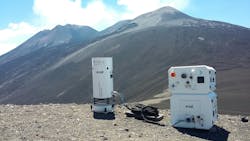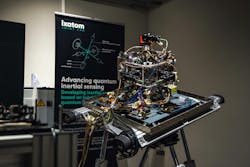Exail is one of the key European players within the field of photonics and is involved in specialty optical fibers, modulation solutions, ultra-stable fibered micro-optical benches, lasers, and quantum sensors. The company wants to empower photonics engineers worldwide with advanced optical technologies that have proven their relevance for many applications: laser, space, sensing, or quantum.
With a focus on innovation, risk-taking, and customer satisfaction, Exail develops advanced high-performance solutions. Meeting the quality and reliability standards required for demanding operations, these solutions are optimized for use in a wide variety of environments, from temperature-stabilized laboratories to deep space.
Bringing complex quantum experiments to industry-standard
As Eric Mounier, Yole Group, wrote in a previous issue of Laser Focus World’s Quantum Innovators: “Photonics will be of great importance to the development of quantum technologies.” He adds that there are only a few suppliers of laser systems usable for quantum systems manipulation, but they are absolutely critical.
Exail is one of these suppliers, developing intelligent laser systems (ILS) and integrated micro-optical benches (iMOB). Developed for quantum sensing, they are now accessible to a wider audience with other optical solutions like polarizing fibers, phase and amplitude lithium niobate (LiNbO3) electro-optic modulators at 800 nm, and laboratory laser modules.
Today, we support research labs, agencies, or companies in developing their quantum technologies with industry standards, whether they rely on neutral atoms, photons, or ions. Pasqal (quantum computing), WeLinq (quantum links), or ThinkQuantum (quantum communication) are examples of flagship startups that use our solutions to bring their quantum innovations to the market.
Pioneering cold-atom based quantum technologies
Exail’s journey into quantum sensing began over a decade ago, inspired by Nobel laureate Alain Aspect’s work. Muquans, a startup founded by Aspect’s former students and colleagues, was acquired by Exail in 2021, and was the first to commercialize quantum sensors based on laser-cooled atoms. Today, nearly 20 of Exail’s Absolute Quantum Gravimeters (AQG) are in operation worldwide. They are deployed for use in real-world applications like volcanology, geodesy, and hydrology, demonstrating the instrument’s reliability.
Our AQG cools and traps rubidium atoms with lasers and performs a matter-wave interferometry sequence on the cloud of atoms to precisely measure its acceleration while it is free-falling under the effect of gravity. This is an absolute sensing method that leverages the quantum advantage. The gravimeter has a robust, user-friendly design—with a separate sensor head and laser source—to ensure accessibility even for nonspecialists. Full installation and remote support are assured throughout the equipment’s lifetime.
We’re now developing next-generation quantum gravimeters through research initiatives like Horizon Europe’s FIQUgS project, aimed at creating an instrument capable of detecting underground objects such as water pipes and mines. Such an extreme sensitivity comes from the Differential Quantum Gravimeter’s ability to simultaneously measure the absolute values of both gravity and its vertical gradient. Exail is also contributing to the CARIOQA program, led by the French and German space agencies (CNES and DLR), to develop a space-based quantum accelerometer for climate monitoring.
Shaping the future of inertial navigation and geophysics
Exail reinvests nearly 20% of its revenue into R&D. One key initiative is the iXAtom joint laboratory,1 where we work with academic experts to push the boundaries of inertial sensing with hybrid classical-quantum technologies. A significant milestone was reached in 2022, with the demonstration of a 3-axis hybrid quantum accelerometer,2 moving closer to developing a drift-free inertial navigation system that exploits the quantum advantage, which could completely overcome the need for external recalibrate using GNSS.
In 2024, iXAtom unveiled a high-performance quantum inertial sensor that combines cold-atom technology with fiber-optic gyroscopes.3 The performance reached by this hybrid sensor under strong rotations and arbitrary orientations meets the operational requirements for diverse platforms, including submarines, aircraft, and spacecraft. The complete validation of this strapdown hybrid sensor could lead to absolute gravity mapping capability and would be a gamechanger in geodesy, to improve the most basic model of the Earth.
Fun fact about Exail
Since 2021, the LUMINA dosimeter, based on an optical fiber architecture manufactured by Exail in collaboration with CNES/Hubert Curien Laboratory/CERN, has been tested by astronauts Thomas Pesquet (FR) and Sultan Al Neyadi (UAE) for the active monitoring of radiation on-board the International Space Station (ISS).
REFERENCES
1. Joint laboratory between Exail and LP2N lab (CNRS/Institut d’Optique Graduate School/Univ. Bordeaux)
2. S. Templier et al., Sci. Adv., 8, 4 (2022).
3. Q. d’Armagnac de Castanet et al., Nat. Commun., 15, 6406 (2024); https://doi.org/10.1038/s41467-024-50804-0.
About the Author
Bruno Desruelle
Bruno Desruelle is VP Photonics at Exail (Saint-Germain en Laye, France).

